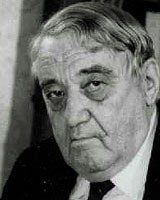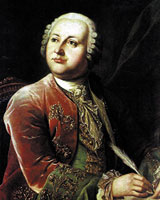SCIENTISTS
 Lev Gumilev (1912-1992) was born on October 1, 1912 in Tsarskoe Selo. His parents were two prominent poets Nikolay Gumilev and Anna Akhmatova. His father was executed because of his anti-bolshevik sympathies when Lev was just 9. In 1934 Gumilev was enrolled in the historical department of Leningrad University, but was expelled in 1935, reinstated in 1937, and finally arrested in 1938 and deported to camp in Norilsk, where he stayed till 1943.
Lev Gumilev (1912-1992) was born on October 1, 1912 in Tsarskoe Selo. His parents were two prominent poets Nikolay Gumilev and Anna Akhmatova. His father was executed because of his anti-bolshevik sympathies when Lev was just 9. In 1934 Gumilev was enrolled in the historical department of Leningrad University, but was expelled in 1935, reinstated in 1937, and finally arrested in 1938 and deported to camp in Norilsk, where he stayed till 1943.
In 1944 Gumilev volunteered for the Soviet Army and participated in the Berlin battle.
In 1946 Lev Gumilev finally graduated from the University and was enrolled in the graduate school of the Leningrad Branch of the Oriental Studies Institute. However, in 1949 he was arrested again, convicted and sentenced to 10 years of GULAG camps.
In 1956 Gumilev was released “for the absence of the case”. He worked as a librarian at the Hermitage museum, and in 1961 defended his doctor’s thesis on ancient Turks. From the 1960s, he worked in the Geography Institute, where he would defend another doctor’s thesis in 1974, this time in geography.
Lev Gumilev was a father of the theory of ethnogenesis, one of the most interesting and revolutionary theories in history, geography and ethnography. To describe his ideas on the genesis and evolution of ethnoses, Gumilev introduced the concept of “passionarity”, which may be explained as the level of vital energy and power characteristic of any given ethnic group. His works are of great interest not only for historians and geographers, but also for climatologists, archeologists, physicists, ethnographists, cultural anthropologists.
Gumilev Memorial Apartment Museum
Exposition tells about creative activity of Lev Gumilev
Kolomenskaya ul., 1/15
Tel: 571-09-52
Tu-Sa 10:30-17:30; M. Dostoevskaya
 Mikhail Lomonosov (1711-1765), a famous Russian scientist and a person of fantastic talents, was born in a small coastal village near Arkhangelsk. His father was a prosperous fisherman and trader. At age nineteen Lomonosov fled home and enrolled in the Slavic-Greek-Latin Academy in Moscow – a religious institution where he learned Latin and was exposed to Aristotelian philosophy and logic.
Mikhail Lomonosov (1711-1765), a famous Russian scientist and a person of fantastic talents, was born in a small coastal village near Arkhangelsk. His father was a prosperous fisherman and trader. At age nineteen Lomonosov fled home and enrolled in the Slavic-Greek-Latin Academy in Moscow – a religious institution where he learned Latin and was exposed to Aristotelian philosophy and logic.
Having displayed outstanding abilities, young Lomonosov was chosen in 1735 to attend lectures given at the Academy of Sciences in St. Petersburg. This experience changed the whole direction of his career. The St. Petersburg Academy was at this time promoting a series of studies on the material resources of Siberia for which it needed trained chemists and metallurgists. From 1736 to 1741 Lomonosov studied these subjects in Germany, first at the University of Marburg, where he gained a thorough grounding in the basic sciences, and later at the famous Mining Academy at Freiburg.
On his return to Russia, Lomonosov became a member of the St. Petersburg Academy, and the remainder of his life was devoted almost exclusively to its affairs. In 1745 he was appointed professor of chemistry at the Academy, where he built a chemical laboratory for instruction and research.
Although Lomonosov published much on various aspects of physics and chemistry, his works were mainly in the form of thesis with a limited circulation. His many activities seem to have prevented him from completing many of his projects, and much of his original work was never published.
Lomonosov’s physical and chemical work was characterized by its emphasis on the use of atomic and molecular modes of explanation. In a century when most scientists regarded heat as material substance, he argued that heat was in fact a form of motion – the result of the motion of the molecules which constitute matter. Lomonosov’s other scientific interests were electricity and light, mineralogy and meteorology, astronomy and geography, not to forget about coloured glass mosaics and porcelain. He also made significant contributions to the philological study of the Russian language, including the development of a scientific vocabulary and wrote a controversial history of Russia.
Lomonosov died from influenza in St. Petersburg on April 4, 1765.
Lomonosov Museum
Museum of the great Russian scientist in the Kunstkammer tower. Exhibition dedicated
to the development of the Russian Academy of Sciences in the 18th century.
Universitetskaya nab., 3
Tel: 328-14-12
Ticket office: Tu-Su 11-17; closed last Tu of the month; M. Vasileostrovskaya
